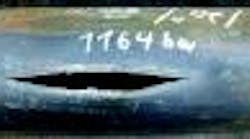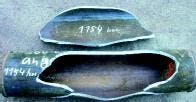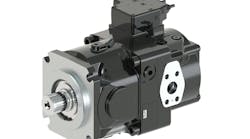Burst behavior of conventional St52 cylinder tubing exhibits double-sided brittle crack propagation.
The problem is, steels commonly used in hydraulic cylinder barrels lack the toughness to be used at these low temperatures. As a result, when failure occurs, brittle failure could cause the barrel to fracture into multiple pieces that could become projectiles. However, a modified St 52 steel now is available that retains its toughness at temperatures 40° C below that of its unmodified counterpart.
The achievement of 50% fractured surface in Charpy impact test can be used as an appraisal. The upper photo shows the burst behavior of a tube made of modified St 52. Modified cylinder tube characteristics show double-sided ductile fracture behavior. However, the burst behavior of a conventional cylinder tube shows a double-sided brittle crack propagation.
Charpy impact energy of longitudinal and transverse specimens is determined for quality control of modified cylinder tubes. However, only the value of the transverse specimen correlates with the highest stress in the cylinder tube. The minimum impact energy of the transverse solid Charpy impact specimen, made of modified material, is 80 J at -4°F. The impact energy in this case causes a double-sided ductile fracture.
Requirements of manufacturers pushed the development of high-strength and ductile cylinder tube grades. The modified material not only offers reliable operation of hydraulic cylinders down to 4°F and lower, but also allows up to 30% thinner tube walls, which reduces cylinder weight.
This material was submitted by Sven Herzig, director of R & D, and Wolfgang Mussmann, MHP Mannesmann Prazisohr GmbH, Mulheim, Germany. Visit www.mhptubes.de for more information.



